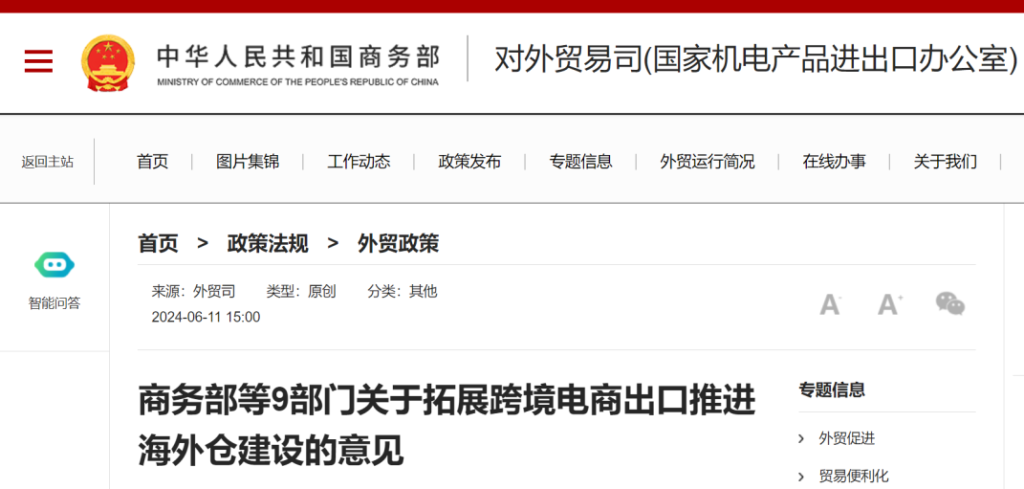
Cross-border e-commerce is a new mode of foreign trade industry driven by scientific and technological innovation, actively applying new technologies, adapting to new trends and cultivating new kinetic energy, and synergistically linked with overseas warehouses and other new foreign trade infrastructures, which can reduce intermediate links and directly reach consumers, and is conducive to promoting the optimization of the structure and stability of foreign trade, and helping to build a new advantage in international economic cooperation, which has already become a vital force for the development of China’s foreign trade, and an important trend for the development of international trade. It has become a vital force for the development of China’s foreign trade and an important trend in the development of international trade.
In order to expand cross-border e-commerce exports, optimize the layout of overseas warehouses, and accelerate the cultivation of new momentum in foreign trade, the State Council agreed to put forward the following views.
I. Actively cultivate cross-border e-commerce business entities
(I) Strongly support cross-border e-commerce to empower industrial development
Guiding local relying on cross-border e-commerce integrated pilot zones, cross-border e-commerce industrial parks, advantageous industrial clusters and foreign trade transformation and upgrading bases, etc., to cultivate “cross-border e-commerce empowered industrial zone” model development benchmarks.
Encourage places with the conditions to focus on local industries, build industrial zone exhibition and selection centers, cooperate with cross-border e-commerce platforms, and set up “online special zones” for industrial zones. Support the introduction of new technologies such as digital people in compliance with the law, through webcasting and other ways to expand sales channels, and drive more advantageous products for export.
Encourage local support for traditional foreign trade enterprises to develop cross-border e-commerce based on the characteristics and advantages of the establishment of online and offline integration, domestic and overseas linkage of the marketing service system.
(ii) Enhance the ability to serve cross-border e-commerce enterprises
Supporting conditional local trade in large-scale, driving effect of good cross-border e-commerce enterprises “one enterprise, one policy” to enhance the “one-to-one” service capacity. Qualified e-commerce technology and other enterprises can declare high-tech enterprises or technologically advanced service enterprises in accordance with the regulations, and cultivate and grow a number of science and technology leading enterprises.
Continuously promote brand building, and encourage qualified cross-border e-commerce enterprises to build independent stations, overseas brand operation centers, enhance the ability to cultivate brands, and actively fulfill their social responsibilities to create a good corporate image.
(III) Supporting cross-border e-commerce enterprises to “exhibit in the sea”.
Support cross-border e-commerce platforms, exports, payments, logistics, overseas warehouses and other enterprises to participate in key exhibitions such as the China Import and Export Fair (Canton Fair) and the Global Digital Trade Expo. Support the principle of marketization to enhance the existing local cross-border e-commerce exhibitions to run the exhibition level, for key products, key markets to organize special overseas promotion, docking activities. Encourage conditional places to organize enterprises to participate in overseas exhibitions, and provide more display and docking platforms for cross-border e-commerce enterprises.
(IV) Strengthen the construction of cross-border e-commerce industry organizations and talent training
Give full play to the role of local industry organizations, strengthen the self-discipline of cross-border e-commerce industry, guide the orderly competition and enhance the ability to protect rights. Guide conditional and willing subjects to study and apply for the establishment of national cross-border e-commerce industry organizations. Encourage conditional places to introduce criteria for identifying high-level talents in the cross-border e-commerce industry, include talents in related fields in the catalog of talent needs and high-level talents, and introduce support initiatives in conjunction with practical support. Implement the current relevant personal income tax incentives. Encourage colleges and universities to offer “cross-border e-commerce + small language” related courses in full-time and part-time mode, so as to provide talent support for cross-border e-commerce exporters to develop emerging markets.
Second, increase financial support
(E) Smooth financing channels for cross-border e-commerce enterprises
Encourage financial institutions to explore optimized service models and provide financial support for cross-border e-commerce enterprises with real trade background. Encourage the optimization of export credit insurance underwriting mode to provide insurance protection for cross-border e-commerce domestic procurement.
(VI) Optimizing cross-border capital settlement services
Supporting cross-border e-commerce enterprises to settle the difference between the marketing, warehousing, logistics and other expenses incurred outside the country for exported goods and the payment for exported goods in accordance with the regulations. Simplify the foreign exchange collection and expenditure procedures for small and micro cross-border e-commerce enterprises, and further broaden the settlement channels. Support qualified banks and non-bank payment institutions to provide cross-border e-commerce enterprises with efficient and low-cost cross-border fund settlement services in accordance with the provisions of the electronic information on transactions.
(VII) Promoting cross-border e-commerce supply chain cost reduction and efficiency enhancement
Promote cross-border e-commerce enterprises to strengthen information sharing, encourage financial institutions to make full use of enterprise-related information, carry out supply chain financial services in accordance with the law, and better empower the development of upstream and downstream industry chains. Encourage strong cross-border e-commerce enterprises to actively apply new technologies and tools such as big data analysis, cloud computing, artificial intelligence, etc., to improve the efficiency of data analysis, R&D and design, marketing services, and supply-demand matchmaking, etc., under the premise of complying with domestic and international laws and regulations.
III. Class demonstration: observation of teaching activities
(viii) Promoting the high-quality development of cross-border e-commerce overseas warehouses
Coordinate and utilize existing funding channels to support the development of cross-border e-commerce overseas warehouse enterprises. Give full play to the role of the Guiding Fund for Innovative Development of Trade in Services, and guide more social capital to support the development of cross-border e-commerce overseas warehouses and other related enterprises in a market-oriented manner. Encourage places with conditions to make good use of the resources of existing equity investment funds, explore the establishment of industrial development funds in a market-oriented manner, and strengthen support for cross-border e-commerce overseas warehouse enterprises. Prepare and introduce operational guidelines on tax rebates for cross-border e-commerce export overseas warehouse business, and further guide enterprises to make good use of the existing policies.
(IX) Enhancing the logistics protection capacity of cross-border e-commerce
Promote the construction of overseas warehouses along the China-European liner trains, and actively develop the “China-European liner train + cross-border e-commerce” mode. Support logistics enterprises to combine the development characteristics of cross-border e-commerce industry, and strengthen the construction of transportation guarantee capacity of sea transportation, air transportation, railroad and multimodal transportation. Encourage cooperation between logistics enterprises and host country’s shipping enterprises to enhance the “last-mile” fulfillment capability.
(J) Assisting cross-border e-commerce-related enterprises to “go global”.
Updating and issuing country cooperation guidelines, strengthening guidance for cross-border e-commerce-related enterprises to “go out” and registering abroad, guiding compliance and orderly operation, and realizing mutual benefits and win-win situations. Encourage cross-border e-commerce overseas warehouses to be located in commerce and logistics-oriented overseas economic and trade cooperation zones, and make good use of supporting facilities and services such as telecommunication, network and logistics in the zones. Support the comprehensive pilot zones for cross-border e-commerce to strengthen cooperation with various overseas economic and trade cooperation zones and ports, and explore and innovate domestic and overseas industrial synergies.
IV. Optimizing Supervision and Services
(XI) Optimize cross-border e-commerce export supervision
Explore and promote the mode of “inspection before shipment” for cross-border e-commerce export consolidation. Strengthen the informationization construction of the Customs cross-border e-commerce customs clearance service system and further improve the system’s functions, so as to enhance the level of customs clearance facilitation for enterprises. Studying the expansion of the pilot project of cross-border e-commerce retail export return across customs districts.
(XII) Upgrading cross-border data management
On the premise of complying with legal and regulatory requirements and ensuring security, promote and regulate cross-border flow of data, and allow orderly and free flow of data in cross-border e-commerce, cross-border payment and other application scenarios. Encourage cross-border e-commerce and overseas warehouse enterprises to use data to empower the upstream and downstream of the industrial chain in accordance with laws and regulations, and enhance the flexible supply capacity of production enterprises.
V. Actively carry out standard rule construction and international cooperation
(M) Accelerate the construction of standards in the field of cross-border e-commerce
Encourage localities to gather resources from industries, enterprises, universities and think tanks to actively participate in the construction of standards in the fields of cross-border e-commerce production, marketing, payment, logistics and after-sale services. Guide associations and enterprises in a position to do so to participate in the formulation of national standards and industry standards in the field of cross-border e-commerce and other new forms of foreign trade. Promote the docking of import and export product standards with the major markets of cross-border e-commerce.
(XIV) Enhance the level of compliance of enterprises
Revise the guidelines for the protection of intellectual property rights in cross-border e-commerce. Encourage localities to increase training on intellectual property protection and maintenance of rights and interests of intellectual property rights abroad, and enhance enterprises’ risk response capability. Support places with the conditions to explore the construction of a cross-border e-commerce compliance service platform, provide enterprises with docking of overseas legal and tax resources, and guide enterprises to properly respond to overseas disputes. Guiding enterprises to comply with the laws and regulations of host countries and respect customs and habits. Actively promote enterprises to upgrade their greening level and promote renewable, recyclable and degradable products and technologies.
(XV) Continuously deepen international exchanges and cooperation
Actively participate in negotiations and exchanges and cooperation with multilateral mechanisms such as the WTO, G20, BRICS, Asia-Pacific Economic Cooperation, UPU, etc., and deeply participate in the formulation of international standards and rules on electronic documents, paperless trade and electronic transactions. Promote the inclusion of cross-border e-commerce, logistics and express delivery, payment and settlement issues in FTA negotiations, bilateral economic and trade commissions and trade facilitation working groups. Vigorously develop “Silk Road E-commerce” and strengthen economic and trade cooperation in relevant fields with countries that have jointly built the “Belt and Road”. Encourage comprehensive pilot zones for cross-border e-commerce and pilot zones for “Silk Road e-commerce” cooperation to dock with international high-standard economic and trade rules such as the Comprehensive and Progressive Trans-Pacific Partnership (CPTPP) and the Digital Economy Partnership Agreement (DEPA), and to actively carry out early and pilot implementation and pressure testing.
Source: Official website of the Ministry of Commerce

